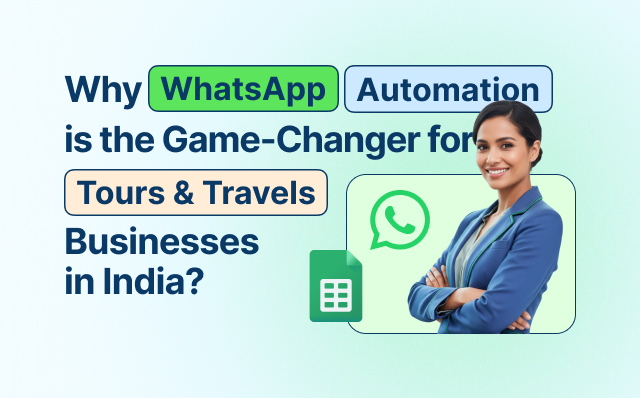In today’s rapidly evolving digital landscape, businesses are constantly on the lookout for tools and technologies that will enhance their customer interactions. One such tool that has gained immense popularity is WhatsApp CRM. As companies shift towards more direct, personalized communication with their customers, the integration of WhatsApp into CRM systems is proving to be a game-changer. But is WhatsApp CRM truly the future of Customer Relationship Management? Let’s dive into the key aspects that make it a compelling solution for businesses today.
The Rise of WhatsApp in Business Communication
WhatsApp is no longer just a messaging app used for personal chats. With over 2 billion active users globally, businesses are increasingly turning to WhatsApp to interact with their customers. This platform’s widespread adoption, ease of use, and instant communication features make it an ideal channel for customer service, sales, and marketing efforts.
WhatsApp CRM goes one step further, combining the power of WhatsApp’s communication platform with CRM (Customer Relationship Management) systems, such as Salesforce, Zoho, HubSpot, and LeadSquared. This integration allows businesses to manage customer interactions seamlessly while automating tasks, tracking conversations, and improving customer satisfaction.
What is WhatsApp CRM?
WhatsApp CRM is the integration of WhatsApp’s messaging functionality into CRM platforms. This integration allows businesses to manage customer conversations directly from their CRM systems, providing a centralized space to store customer data, track interactions, and engage with customers in real-time. By leveraging a WhatsApp CRM integration, companies can streamline their workflows and ensure that all customer touchpoints are captured within a single system.
For instance, when a customer sends a message via WhatsApp, that conversation can be automatically logged in the CRM, giving sales or support teams instant access to previous interactions. Moreover, CRM tools can trigger automated messages, allowing businesses to respond faster and more effectively to customer queries.
Why WhatsApp CRM is Gaining Traction
There are several reasons why WhatsApp CRM is becoming an essential tool for businesses:
1. Direct and Personal Communication
Customers want fast, easy access to businesses, and WhatsApp provides just that. With a WhatsApp CRM integration, businesses can instantly reply to customer queries, providing timely responses and improving overall customer satisfaction. The personal nature of WhatsApp helps businesses build stronger relationships with their customers, leading to increased loyalty.
2. Centralized Customer Data
One of the core advantages of a CRM is its ability to store customer information in one place. When WhatsApp is integrated with your CRM, every customer conversation is recorded, giving your teams full visibility into previous interactions. This centralized data makes it easier to manage leads, track communication history, and provide a more personalized service.
3. Automated Responses and Workflow Efficiency
Using a WhatsApp CRM allows businesses to automate responses for common customer queries. For example, automated greetings, FAQs, or payment confirmation messages can be sent through the platform. This not only reduces the response time but also frees up your support team to handle more complex tasks. With automation, businesses can scale their customer service efforts without adding extra resources.
4. Improved Lead Management
A major function of CRM systems is to manage leads effectively. With WhatsApp CRM, lead management becomes even more efficient. Leads from WhatsApp can be automatically imported into your CRM, categorized based on their interactions, and followed up with in real-time. This ensures that no lead is left unattended, improving the chances of conversion.
5. Enhanced Customer Engagement
WhatsApp CRM opens up new possibilities for customer engagement. Businesses can use WhatsApp to send personalized offers, updates, or reminders, encouraging interaction in a way that feels less intrusive than traditional email or phone calls. The instant, two-way communication nature of WhatsApp also makes it easier to address customer concerns, leading to higher satisfaction and engagement rates.
6. Detailed Reporting and Insights
With a WhatsApp CRM, businesses can track and measure the effectiveness of their communication efforts. CRM platforms provide in-depth reporting tools that allow you to monitor response times, customer satisfaction scores, and conversation history. These insights are invaluable for improving customer service strategies and identifying areas for optimization.
Challenges of Implementing WhatsApp CRM
While WhatsApp CRM offers significant benefits, it’s important to be aware of some challenges as well.
1. Compliance and Privacy Concerns
Since customer data is a critical component of any CRM, businesses must ensure they are compliant with data protection laws like GDPR. Handling customer data through WhatsApp requires careful consideration of privacy regulations, especially when storing sensitive information.
2. Scalability Issues
For businesses with large volumes of customer interactions, scaling WhatsApp CRM can be a challenge. While automation can help, managing a high volume of personal conversations may require additional resources or more sophisticated tools.
3. Learning Curve for Teams
Integrating WhatsApp CRM into your business processes requires your teams to adapt to new systems and workflows. Providing proper training and ensuring a smooth transition can help overcome this challenge, but it’s something businesses must plan for.
Best Practices for Implementing WhatsApp CRM
If you’re considering adopting a WhatsApp CRM solution, here are a few best practices to ensure success:
Choose the Right CRM Platform
Make sure the CRM platform you choose supports WhatsApp integration. Solutions like Zoho, HubSpot, and Salesforce offer seamless integration with WhatsApp, making it easy to manage your customer interactions in one place.
Prioritize Customer Privacy
Always prioritize customer privacy by ensuring that you’re handling data in a secure and compliant manner. Inform your customers about how their data will be used and give them the option to opt-out if they prefer.
Leverage Automation
Use automation tools within your CRM to handle common tasks like sending out welcome messages, reminders, or FAQs. This can help you manage large volumes of inquiries efficiently without compromising on customer service quality.
Monitor Performance
Regularly track your team’s performance using the reporting tools available within your CRM. Keep an eye on metrics like response times and customer satisfaction to continuously improve your WhatsApp CRM strategy.
Is WhatsApp CRM the Future?
In conclusion, WhatsApp CRM is poised to become an essential tool for modern businesses. As customers increasingly expect instant, personalized communication, WhatsApp provides the perfect platform for businesses to meet these demands. By integrating WhatsApp with CRM systems, businesses can streamline their communication processes, improve lead management, and enhance customer satisfaction.
At Happilee, we specialize in WhatsApp Business API solutions, helping businesses automate and optimize their customer communication through WhatsApp CRM integration. Whether you’re looking to improve your customer service, marketing, or sales efforts, our solutions can help you stay ahead in today’s competitive landscape.


